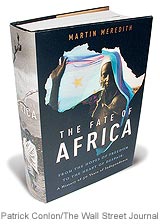Speaking of Paul Wolfowitz, the new World Bank President:
His favorite new source book is the World Bank’s “Doing Business” report, an annual guide to the obstacles that countries impose on their own entrepreneurs. The 2006 version is just out, and for the first time Mr. Wolfowitz had it rank countries, from 1 to 155, on the “ease of doing business.” New Zealand ranked first, and the U.S. third (after Singapore), but African nations held down 25 of the last 30 places.
Take Burkina Faso, a landlocked West African country that came in at . . . 154. “If you were in a food supply business,” Mr. Wolfowitz says, “registering a business would require minimum capital equal to nearly five times annual income. Fees alone cost 1½ times income per capita . . . to register your land, you have to pay fees, 16% of the value of the land. So the result is in a country of 12 million people, only 50,000 are in the formal” economy.
So why is he optimistic? Burkina has grown for the last decade, he says, and the country has political cohesion. “I had a great meeting with the president of Burkina” on a recent trip, and “I shouldn’t say this, but I want to find a way to communicate these results to him and say, do something about it, your country will grow even more.”
PAUL A. GIGOT. “Dr. Wolfowitz, I Presume.” Wall Street Journal (September 24, 2005): A10.
The “Doing Business” report is in its second or third annual version, and is described enthusiastically in Thomas Friedman’s new book The World is Flat. John Devereux suggested to me that one interpretation of the criteria used for the ranking, is that they are a step in the direction of measuring openness to creative destruction.



